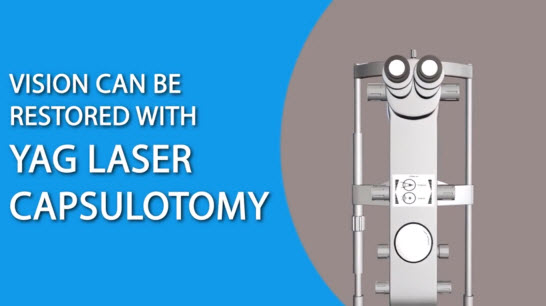The journey to clear vision doesn’t always end after cataract surgery. For some individuals, a condition known as posterior capsule opacification (PCO) can cause vision to become cloudy once again. Fortunately, advancements in medical technology have led to a remarkable solution: YAG Laser Capsulotomy. This minimally invasive procedure has become a key player in addressing PCO and restoring clear vision to those who have undergone cataract surgery.
Understanding Posterior Capsule Opacification (PCO)
After cataract surgery, the cloudy lens is replaced with an artificial intraocular lens (IOL) to restore vision. However, over time, the thin capsule that holds the IOL in place can become cloudy, causing vision to blur once again. This phenomenon is known as posterior capsule opacification (PCO) or “secondary cataract.” While not a recurrence of cataract, PCO can have similar visual effects.
Introducing YAG Laser Capsulotomy
YAG Laser Capsulotomy offers a precise and effective solution for PCO. This outpatient procedure involves using a YAG laser to create a small opening in the cloudy capsule, allowing light to pass through unimpeded. The laser creates an opening in the center of the capsule, similar to the natural opening that was made during the initial cataract surgery.
The Procedure
YAG Laser Capsulotomy is performed with the patient seated at a laser system. Eye drops are used to dilate the pupil and numb the eye. The laser is then carefully focused on the cloudy capsule, and a painless laser pulse creates an opening. The procedure is relatively quick, often taking only a few minutes.
Immediate Improvement
One of the most remarkable aspects of YAG Laser Capsulotomy is the almost immediate improvement in vision. Patients often report clearer vision within hours to days after the procedure.
Minimally Invasive Nature
YAG Laser Capsulotomy is considered minimally invasive because it does not require any incisions or stitches. The laser energy passes through the outer layers of the eye without causing damage.

The Benefits of YAG Laser Capsulotomy
The advantages of YAG Laser Capsulotomy are evident:
• Rapid Results: Patients experience a rapid improvement in vision shortly after the procedure.
• No Downtime: The procedure is typically quick, and patients can resume their normal activities soon after.
• Non-Invasive: YAG Laser Capsulotomy doesn’t involve surgical incisions, reducing the risk of complications.
• Long-Lasting: Once the cloudy capsule is treated, the improved vision is usually maintained.
The Future of YAG Laser Capsulotomy
As medical technology advances, the future of YAG Laser Capsulotomy holds the potential for even more refined and precise treatments. Researchers are exploring ways to further enhance the procedure and minimize any potential side effects.
Conclusion
YAG Laser Capsulotomy stands as a testament to the strides made in ophthalmology. By offering a minimally invasive solution to posterior capsule opacification, this procedure has transformed the lives of individuals who experience vision cloudiness after cataract surgery. With its rapid results and long-lasting benefits, YAG Laser Capsulotomy continues to illuminate the path to clearer vision.
Frequently Asked Questions – YAG Laser Capsulotomy
Q1: Is YAG Laser Capsulotomy painful?
A1: The procedure itself is typically painless. Some patients may experience minor discomfort or sensitivity to light following the procedure, which usually subsides within a day or two.
Q2: How long does the improvement in vision last?
A2: The improvement in vision following YAG Laser Capsulotomy is usually permanent. Once the cloudy capsule is treated, it rarely recurs.
Q3: Are there any risks associated with YAG Laser Capsulotomy?
A3: YAG Laser Capsulotomy is generally considered safe. However, as with any medical procedure, there are potential risks. Your eye care specialist will discuss these risks with you before the procedure.
Q4: Can both eyes be treated in the same session?
A4: Yes, YAG Laser Capsulotomy can be performed on both eyes in separate sessions or on the same day.
Q5: Are there any restrictions after the procedure?
A5: Patients may be advised to use eye drops in some cases. It’s important to follow the post-operative instructions provided by your eye care professional.
